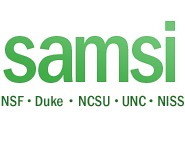2011-12 Program on Uncertainty Quantification

The structure of the 2011-12 UQ program was unique among SAMSI programs in that, instead of running two year-long programs in parallel as is usually done, we ran one UQ program that had four sub-programs with which individual workshops are associated:
- Methodology Program
- Climate Modeling Program
- Engineering and Renewable Energy Program
- Geosciences Program
Click on any link above for more information.
Mathematical models intended for computational simulation of complex real-world processes are a crucial ingredient in virtually every field of science, engineering, medicine, and business. Two related but independent phenomena have led to the near-ubiquity of models: the remarkable growth in computing power and the matching gains in algorithmic speed and accuracy. Together, these factors have vastly increased the applicability and reliability of simulation - not only by drastically reducing simulation time, thus permitting solution of larger and larger problems, but also by allowing simulation of previously intractable problems.
Utilization of such computer models of processes requires addressing Uncertainty Quantification, a greatly expanding field focusing on at least the following issues:
- Models are invariably not a completely accurate reflection of reality; this bias or discrepancy needs to be acknowledged in analysis and prediction.
- The models are often so expensive to run that model outputs may be available for only a few inputs; for practical purposes the model predictions are thus unknown at these other inputs.
- There are often uncertainties in the initial conditions for the models.
- The models typically have numerous unknown parameters.
- The models may have stochastic features.
- Predictions combining model output and noisy data (data assimilation) is often required.
The intellectual content of computational modeling comes from a variety of disciplines, including mathematics, statistics, probability, operations research, and computer science. Despite a wide diversity in methodology and applications, there are a variety of common challenges in developing, evaluating and using complex computer models of processes.
Organizing Committee
Program Leaders: Amy Braverman (JPL, Cal. Tech and UCLA), Don Estep (Colorado State), Roger Ghanem (USC), David Higdon (LANL), Christine Shoemaker (Cornell), Jeff Wu (Georgia Tech)
Local Scientific Coordinators: James Nolen (Duke), Jan Hannig (UNC)
Directorate Liaison: Pierre Gremaud (N.C. State)
National Advisory Committee Liaison: Max Gunzburger (Florida State)
Description of Activities
SAMSI/Sandia UQ Summer School
The program was preceded by a Summer School for graduate students and young researchers, June 20-24, 2011, in Albuquerque, NM
Workshops:
The program officially started in late Summer 2011 with four opening workshops
- Opening Workshop and Tutorials: Methodology of Uncertainty Quantification,
September 7-10, 2011 - Climate Change Workshop, August 29-31, 2011
- Engineering and Renewable Energy Workshop, September 19-21, 2011
- Geosciences Applications Workshop, September 21-23, 2011
These workshop aimed to engage as large a part of the statistics, mathematics, and scientific communities as possible. Transition Workshops at the end of the program disseminated program results and charted a path for future research in the area. In addition, mid-program specialized workshops were held both at SAMSI and at partner institutions:
- Scientific Problems for the Smart Grid - October 3-5, 2011
- High Dimensional Approximation for Uncertainty Quantification - November 10, 2011
- Observations Workshop- January 17-19, 2012
- Multiscale Modeling and Uncertainty Quantification for Nuclear Fuel Performance - January 25-26, 2012
- Simulation of Rare Events - February 13-14, 2012
- Models with Complex and Uncertain Domains - March 22-23, 2012
- Uncertainty Quantification for High-Performance Computing, May 2-4, 2012
- Transition Workshop - May 21-23, 2012
Courses:
There was a summer course, for students, postdocs and others preceding the program. Several courses at the graduate level were taught at SAMSI, throughout the year.
Working Groups: Working groups met throughout the program to pursue particular research topics identified in the kickoff workshop (or subsequently chosen by the working group participants). The working groups consisted of SAMSI visitors, postdoctoral fellows, graduate students, local faculty and scientists. These groups are at the very heart of the scientific activities at SAMSI.
SIAM Conference on Uncertainty Quantification
This conference took place April 2-4, 2012, at the Raleigh Marriott City Center Hotel in Raleigh, NC, just down the road from SAMSI. The event is sponsored by the SIAM Activity Group on Uncertainty Quantification. The various working groups from the SAMSI UQ program both contributed to, and benefited from, this event in a significant way.
Further Information
For additional information about the program send E-mail to [email protected]
